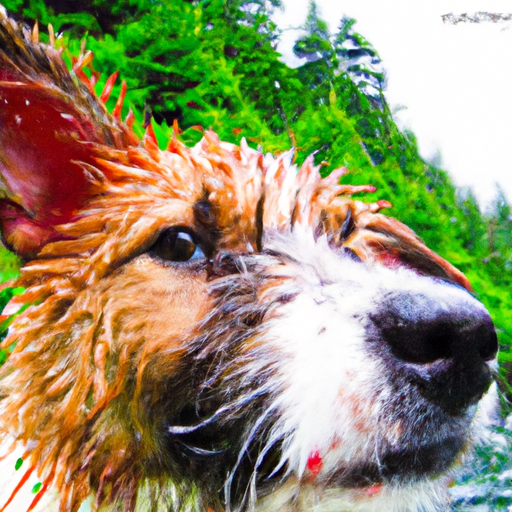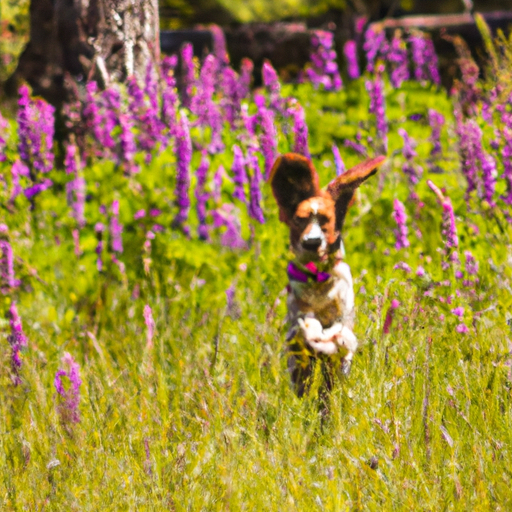Planning a hiking adventure with your furry friend? Look no further for the perfect snacks to keep your dog energized and nourished on the trail. In this article, we will explore a variety of healthy snacks specifically designed to meet your dog's nutritional needs, ensuring they have the stamina and vitality to join you on your outdoor escapades. From homemade treats bursting with wholesome ingredients to convenient store-bought options, discover the best trail snacks that will have your four-legged companion wagging their tail with delight.
Healthy Snacks for Dogs on the Trail
When you're out on the trail with your canine companion, it's important to provide them with healthy snacks to keep them energized and satisfied. Just like us, dogs need proper nutrition to maintain their energy levels and overall health. In this article, we will explore the importance of healthy snacks for dogs, considerations for choosing trail snacks, various nutritious options for snacks, both homemade and commercially available, tips for packing and storing snacks, portion control and feeding guidelines, special considerations for different dog groups, snacks to avoid, and the use of snacks for training and positive reinforcement. By the end, you'll have all the information you need to ensure your furry friend is well-fed and happy on your outdoor adventures.
Importance of Healthy Snacks for Dogs
Just like humans, dogs benefit greatly from a well-balanced diet. Healthy snacks provide an extra boost of nutrients to support their overall well-being. When engaging in strenuous activities such as hiking or trail running, dogs burn more calories and require additional nutrition to keep up their energy levels. Healthy snacks on the trail can help prevent fatigue and ensure that your dog is able to enjoy the adventure to the fullest. They can also contribute to a shiny coat, strong muscles, and a healthy immune system. So, while trail snacks may seem like a small detail, they are a vital part of your dog's overall health and performance.
Considerations for Trail Snacks
While providing your dog with snacks on the trail is important, it's equally crucial to choose snacks that are suitable for the outdoor environment. Consider the following factors when selecting trail snacks for your four-legged friend:
-
Portability: Snacks that are easy to carry and store are ideal for the trail. You'll want to choose snacks that won't take up too much space in your backpack and won't spoil or crumble easily.
-
Nutritional Value: Look for snacks that offer a good balance of nutrients. Protein, healthy fats, vitamins, and minerals are all essential for your dog's health. Avoid snacks that are high in artificial additives, fillers, or excessive amounts of sugar.
-
Allergies and Restrictions: If your dog has any known allergies or dietary restrictions, make sure to choose snacks that are safe for them to consume. Avoid ingredients that may trigger an allergic reaction or aggravate any existing health conditions.
-
Water Content: Consider snacks that have a moderate water content, especially if you'll be spending long hours on the trail. Adequate hydration is important for your dog's overall well-being, and snacks with some water content can contribute to their hydration levels.
By taking these considerations into account, you can ensure that the trail snacks you choose are safe, nutritious, and enjoyable for your furry friend.
Choosing the Right Snacks for Your Dog
When it comes to choosing the right snacks for your dog, there are numerous options to consider. Here are some nutritious choices that are suitable for trail snacks:
Fresh Fruits
Fresh fruits can be a healthy and refreshing snack for your dog on the trail. Fruits like sliced apples, watermelon, or blueberries provide essential vitamins, minerals, and antioxidants. However, it's important to be cautious about fruits that may be toxic to dogs, such as grapes and raisins. Always research the safety of a specific fruit before offering it to your dog.
Vegetable Treats
Vegetables are another excellent option for trail snacks. Carrot sticks, cucumber slices, or even broccoli florets can provide your dog with a satisfying crunch and a boost of fiber. Some vegetables, like celery, can also help keep your dog hydrated due to their high water content.
Protein-Rich Snacks
Protein is an essential macronutrient for dogs, especially when engaging in physical activities. Consider protein-rich snacks like lean chicken or turkey jerky, boiled eggs, or freeze-dried meat. These snacks provide a good source of energy and help support muscle recovery.
Grain-Based Snacks
Grain-based snacks can be a great source of carbohydrates for dogs, providing a quick energy boost. Look for options like whole grain crackers, oatmeal cookies, or granola bars formulated specifically for dogs. Just ensure that the grains used are of good quality and not overly processed.
Homemade Dog Treat Recipes
If you prefer to make your own dog treats, there are plenty of simple and nutritious recipes you can try. Here are a few homemade snack ideas for your furry friend:
Peanut Butter and Banana Biscuits
These biscuits are a tasty combo of peanut butter and banana that your dog will love. Simply mash a ripe banana, mix it with natural peanut butter, and add whole wheat flour until you have a dough. Roll out the dough, cut it into biscuit shapes, and bake until golden brown.
Sweet Potato Chews
Sweet potatoes are an excellent source of dietary fiber and essential vitamins. To make homemade sweet potato chews, slice a sweet potato into thin strips and bake them at a low temperature for a few hours until they're dehydrated and chewy.
Chicken and Rice Bites
These bites are a delicious source of protein and carbohydrates. Cook chicken breast until fully cooked, then shred it and mix it with cooked rice. Form the mixture into small balls and bake them until firm.
Pumpkin and Oatmeal Cookies
Pumpkin is a nutrient-rich ingredient that many dogs enjoy. To make pumpkin and oatmeal cookies, mix canned pumpkin puree with rolled oats, a small amount of honey, and cinnamon. Shape the mixture into cookies and bake until slightly firm.
By preparing these homemade treats, you have full control over the ingredients and can cater to your dog's unique dietary needs and taste preferences.
Commercially Available Trail Snacks for Dogs
If making homemade snacks is not your preferred option, there are also many commercially available snacks designed specifically for dogs on the trail. These snacks are convenient, pre-packaged, and often formulated to provide the necessary nutrients for active dogs. Here are a few types of commercially available trail snacks:
Pre-packaged Healthy Snacks
Many pet food companies offer pre-packaged healthy snacks for dogs. These snacks come in a variety of flavors and forms, such as bite-sized treats or energy bars. Look for options that use high-quality ingredients and avoid artificial additives or preservatives.
Freeze-Dried Dog Treats
Freeze-dried dog treats are a lightweight and convenient option for the trail. These treats are made by removing moisture from fresh ingredients, preserving their nutritional value and flavors. They often come in single-ingredient options like chicken, beef, or fish, providing a naturally rich source of protein.
Dehydrated Meat Treats
Similar to freeze-dried treats, dehydrated meat treats are another option that is lightweight and easy to pack. These treats are made by slowly removing moisture from meat, resulting in a chewy and flavorful snack. They often come in various meat options like beef, lamb, or venison.
Trail Mix for Dogs
Trail mix made specifically for dogs is a convenient snack option that combines various ingredients to provide a well-rounded nutritional profile. These mixes often consist of a variety of protein sources, grains, and fruits. They are typically low in sodium and free from artificial additives.
When choosing commercially available trail snacks, be sure to read the ingredients list and check for any potential allergenic ingredients or additives that may not be suitable for your dog.
Tips for Packing and Storing Trail Snacks
Proper packaging and storage of trail snacks are essential to maintain their freshness, taste, and nutritional value. Follow these tips to ensure your dog's snacks stay in top condition:
Proper Packaging for Fresh Snacks
If you're packing fresh snacks like fruits or vegetables, store them in airtight containers or resealable bags to prevent them from getting crushed or spoiled. Consider using food-grade silicone storage bags, as they are lightweight, durable, and easy to clean.
Choosing Portable Snack Containers
When it comes to packing homemade or commercially available snacks, choose portable snack containers that are convenient and keep the treats fresh. Look for containers with secure lids and ones that are easy to open, especially if you'll be using them on the trail. Consider collapsible silicone containers as they take up minimal space when empty.
Food Safety Considerations
When packing trail snacks, it's crucial to prioritize food safety. Make sure to handle the snacks with clean hands, avoiding cross-contamination between different ingredients. If you're packing perishable snacks like fresh meat or cheese, be mindful of the temperature outside and the duration of your hike. It's generally recommended to pack a cooler bag with ice packs to keep perishable snacks fresh.
Storing Snacks at the Right Temperature
Proper temperature control is essential to maintain snack freshness and food safety. Avoid leaving snacks in direct sunlight or extreme heat, as this can cause spoilage or melting. If you're packing frozen snacks like frozen meat or yogurt, make sure to keep them in an insulated container or cooler to prevent thawing.
By packing and storing your dog's trail snacks properly, you can ensure that they remain safe, appetizing, and enjoyable throughout your outdoor adventure.
Portion Control and Feeding Guidelines on the Trail
When it comes to feeding your dog on the trail, proper portion control and feeding guidelines play a vital role. Here are some considerations to keep in mind:
Determining the Right Snack Portions
The appropriate snack portions depend on your dog's size, activity level, and individual needs. As a general guideline, snacks should make up no more than 10% of your dog's daily calorie intake. Consider consulting with your veterinarian to determine the specific calorie needs and ideal snack portions for your dog.
Frequency of Snack Feeding
When to offer snacks on the trail depends on the duration and intensity of the activity, as well as your dog's energy levels. It's generally recommended to offer snacks during breaks or rest periods to replenish their energy. Avoid feeding snacks immediately before or after intense exercise to prevent the risk of bloat or digestive issues.
Considering Your Dog's Activity Level
Active dogs require more snacks to fuel their energy compared to less active dogs. Take into account the duration and intensity of the trail activity, as well as your dog's fitness level, when determining the frequency and quantity of snacks to provide. Be observant of your dog's behavior and energy levels to ensure they're not overexerting themselves.
Hydration Considerations
Snacks alone are not sufficient to keep your dog hydrated on the trail. Always provide ample fresh water for your dog to drink during breaks. Consider bringing a collapsible water bowl or a hydration pack designed for dogs to make it easier for them to drink on the go. Remember, hydration is just as important as nutrition when it comes to keeping your dog healthy and comfortable on the trail.
By being mindful of portion control, feeding frequency, activity levels, and hydration, you can ensure that your dog's snack intake is appropriate for their needs and supports their overall well-being during the trail.
Special Considerations for Trail Snacks
Certain dog groups require special considerations when it comes to selecting trail snacks. Here are a few groups and some recommendations for their specific needs:
Snacks for Senior Dogs
Senior dogs may have different nutritional requirements compared to younger dogs. Opt for snacks that are easy to chew and digest, and that support joint health. Treats containing glucosamine or chondroitin may be beneficial, as they can promote healthy joints and mobility.
Snacks for Puppies
Puppies have specific nutritional needs for growth and development. Look for snacks that are formulated for puppies, ensuring they have the appropriate balance of vitamins, minerals, and nutrients. Always follow the feeding guidelines provided on the packaging and consider consulting your veterinarian for tailored advice.
Snacks for Dogs with Dietary Restrictions
If your dog has dietary restrictions or sensitivities, there are snacks available that cater to those needs. Look for snacks labeled as hypoallergenic or formulated for dogs with specific dietary restrictions. These snacks often exclude common allergenic ingredients like grains, soy, or dairy.
Avoiding Allergenic Ingredients
Even if your dog doesn't have identified allergies, it's generally best to avoid snacks that contain common allergenic ingredients such as wheat, corn, or soy. These ingredients can be harder to digest and may cause unnecessary gastrointestinal upset. Opt for snacks that have limited ingredient lists and are free from artificial additives or fillers.
By considering the unique needs of different dog groups, you can choose snacks that are specifically tailored to their requirements and ensure they receive the optimal nutrition while on the trail.
Trail Snacks to Avoid
While there are many healthy and nutritious snacks to choose from, there are also some snacks that should be avoided when it comes to feeding your dog on the trail. Here are a few snacks that pose potential risks to your dog's health:
Chocolate and Other Toxic Foods
Chocolate is well-known for being toxic to dogs, but it's not the only food to be cautious of. Grapes, raisins, onions, garlic, and certain artificial sweeteners like xylitol can also be toxic to dogs. Avoid offering any snacks that contain these ingredients, as they can lead to serious health issues or even be fatal.
High-Fat Snacks
Snacks that are high in fat can be hard for dogs to digest, especially during physical activities on the trail. Avoid fatty treats like bacon, sausage, or greasy leftovers. High-fat snacks can potentially lead to pancreatitis or gastrointestinal issues for your dog.
Unhealthy Fillers and Additives
Snacks that contain excessive amounts of artificial additives, preservatives, or fillers are not ideal choices for your dog's nutrition. Read the ingredients label and choose snacks with simple and recognizable ingredients.
Processed and Artificial Snacks
Just like with humans, processed and artificial snacks are not the best choice for your dog's health. These snacks often lack proper nutrition and may contain ingredients that can be harmful or cause allergies in some dogs. Opt for natural and minimally processed snacks whenever possible.
By being aware of these snacks to avoid, you can prevent potential health risks and ensure that your dog's trail snacks are safe and beneficial.
Training and Reward-Based Snacks for the Trail
Snacks can be a valuable tool for training and positive reinforcement on the trail. Here are some considerations for using snacks in this context:
Using Snacks as Positive Reinforcement
Snacks can be highly motivating rewards for dogs during training sessions or when reinforcing good behaviors on the trail. When your dog successfully responds to a command or exhibits desirable behavior, offer a small snack as a reward. This positive reinforcement helps reinforce good behavior and encourages your dog to continue behaving well.
Training Treat Options
For training purposes, it's helpful to have small, easily portable treats that can be given quickly and without interrupting the training flow. Look for treats that can be broken into small pieces, like small training bites or morsels. These treats should be highly palatable to your dog and capture their attention.
Rewarding Good Behavior on the Trail
In addition to training sessions, you can also use snacks to reward your dog for general good behavior on the trail. For example, if your dog walks politely on the leash or shows calm behavior when encountering other hikers or animals, reward them with a snack. This helps reinforce positive behavior and strengthens the bond between you and your dog during your outdoor adventures.
Considerations for Treat Variety
Using a variety of treats can help keep your dog engaged and interested during training and on the trail. Consider switching between different flavors or textures to maintain their excitement. However, be mindful of any potential allergies or sensitivities your dog may have and avoid treats that could trigger adverse reactions.
By utilizing snacks for training and positive reinforcement, you can enhance your dog's learning experience and strengthen your bond while enjoying the trail together.
Monitoring and Adjusting Your Dog's Snack Intake
Monitoring your dog's snack intake is essential to ensure they receive the appropriate nutrition and maintain a healthy weight. Here are some important considerations:
Assessing Your Dog's Nutritional Needs
It's important to assess your dog's overall nutritional needs, taking into account factors such as age, size, activity level, and any underlying health conditions. Consider consulting with your veterinarian and discussing your dog's specific needs. They can provide guidance on appropriate snack choices and portion sizes.
Monitoring Weight and Body Condition
Regularly monitor your dog's weight and body condition to ensure they are maintaining a healthy state. Excessive weight gain or loss can be an indication that your dog's snack intake needs adjustment. If you notice any significant changes, consult with your veterinarian for tailored advice on managing your dog's weight and nutrition.
Consulting with a Veterinarian
If you have any concerns about your dog's nutrition or snack intake, it's always best to consult with your veterinarian. They can provide individualized recommendations based on your dog's specific needs. Whether you need assistance with choosing the right snacks, adjusting portion sizes, or managing any dietary restrictions, your veterinarian is the best resource for tailored advice and guidance.
Adjusting Snacks Based on Performance
As your dog's activity level increases or changes, you may need to adjust their snack intake to support their performance. More demanding activities may require additional snacks to maintain their energy levels, while less active days may require fewer snacks to avoid excessive caloric intake. Be observant of your dog's overall performance and adjust their snack intake accordingly.
By monitoring and adjusting your dog's snack intake as needed, you can ensure that they receive the right amount of nutrition and support their overall health and performance on the trail.
In conclusion, providing your dog with healthy snacks on the trail is crucial for their overall well-being and performance. By considering the importance of healthy snacks, choosing the right options, packing and storing snacks properly, being mindful of portion control and feeding guidelines, considering special dietary needs, and avoiding harmful snacks, you can ensure that your furry friend remains happy and healthy throughout your outdoor adventures. Remember, healthy snacks are an essential part of keeping your dog fueled, nourished, and ready to tackle any trail with enthusiasm.






